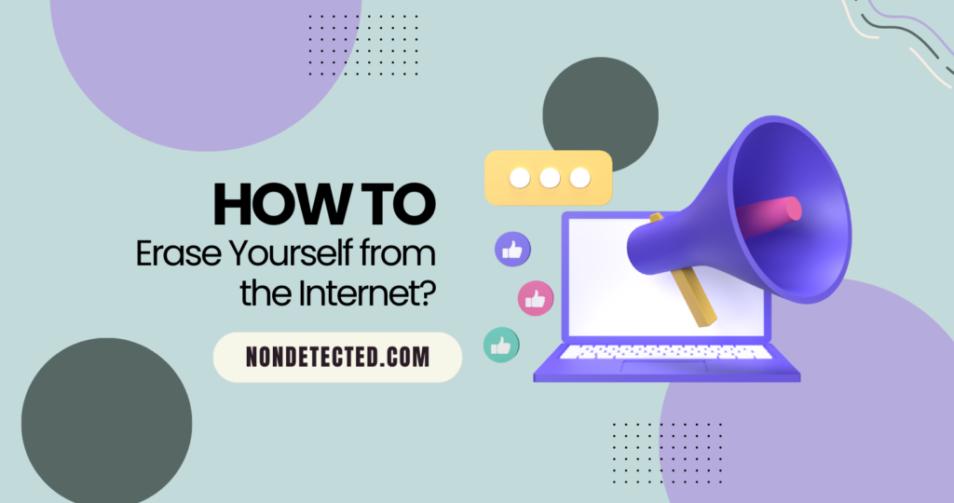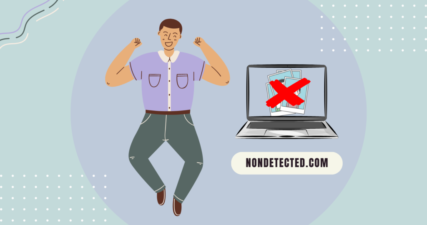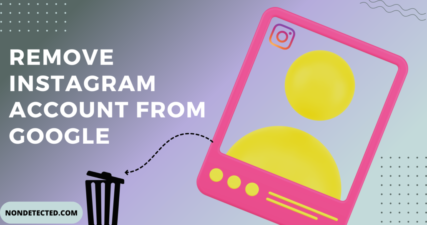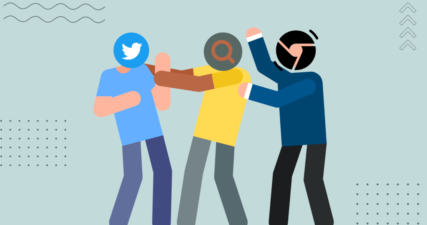How to Erase Yourself from the Internet?

Can you delete yourself from the internet? Hmm… Picture this: You’re sitting in your favorite coffee shop, engrossed in your laptop. As you sip your latte, you click through your emails, scroll through social media, and check the latest headlines.
Now, imagine invisible strings attached to your fingertips, each click sending out a new thread into the world. These strings are your digital footprint, and they’re woven into the fabric of the internet.
As an expert in data privacy and digital identity management, I’ve seen the extent to which these threads can become tangled and complex, making it vital to manage them actively.
The Giants of the Internet and Their Data Collection Practices
You might be thinking, “So what? I have nothing to hide.” However, when companies like Facebook, Amazon, and Google hold extensive data about you, it’s not just about hiding something; it’s about control.
Real-Life Examples
Take Facebook, for instance. Every like, comment, or share feeds their algorithms. They know your interests, relationships, and even predict your behavior. They utilize this data to serve you targeted advertisements. That innocent-looking ad for a book or gadget is no accident; it’s a carefully calculated suggestion based on your data.
Amazon, on the other hand, knows your shopping habits. They know what you buy, how often you buy it, and even what you are likely to buy in the future. Ever noticed how Amazon seems to know what you need before you do? That’s no magic trick; it’s data analysis.
Meanwhile, Google is the king of information. Your searches, locations, phone numbers, browser history (search history) and interactions across various platforms are meticulously collected. Ever been talking about something, only to find an advertisement for it later? That’s Google’s data collection at work.
Data Brokers
Now, let’s step into the shadows. Beyond the major players, countless obscure data brokers operate behind the scenes. You may never have heard of them, but they know you. They amass information from various sources, and they trade this data like it’s on the stock market. Your personal and financial information is their commodity.
For instance, in 2018, a journalist named Kashmir Hill wanted to see how deep this rabbit hole goes. She bought her data from a few data broker sites and was astonished. They had her mailing address, phone number, and a list of all her online purchases.
These data brokers don’t just keep the data; they sell it to advertisers, employers, and even health insurers. Imagine being denied a job or insurance simply because some data broker sold your information.
Social Media and the Ghosts of Internet Past
Social media, that double-edged sword of connectivity, is an essential part of our lives. We share, we comment, and we engage. However, what happens when that casual tweet or status update from years ago resurfaces? What was acceptable five years ago might not be today.
Take the case of Justine Sacco. In 2013, she posted a tweet before boarding a flight. By the time she landed, the tweet had gone viral, and she was labeled a racist. She lost her job and had to rebuild her life because of a single social media post.
The Web of Data and Your Life
What does this all mean? It means that your digital and online footprint, whether through a social media account or data brokers, has tangible effects on your life. You’re not just an observer; you’re actively entangled in this web.
In the next section, I will delve into practical steps to help you untangle yourself from this web, reclaim your personal data back, and regain control of your digital identity. Stay with me as we venture into the intricacies of managing and protecting your digital fingerprint.
Regaining Control: Disentangling Your Digital Threads

Now that we’ve examined how our lives are intertwined with the digital world, it’s time to discuss how to take back control. It’s no small feat, but you can make substantial progress by breaking it down into actionable steps. Trust me; it’s worth the effort.
Dealing with Data Brokers
As we’ve uncovered, data brokers are entities that trade your personal information. To limit their reach into personal details, you need to actively opt out from their databases. This might sound daunting, but thankfully, there are resources to help.
One shining example is the US-based nonprofit Privacy Rights Clearinghouse, which has compiled data broker databases, providing you with their contact details and policies.
Additionally, if you’re in Europe, the GDPR allows you to request data deletion. This is a game-changer because it grants you a say in what happens to your information and increases the chances of avoiding identity theft from third party services.
Remember Kashmir Hill, the journalist we talked about earlier? She has demonstrated that one person can make a difference by standing up to these data brokers.
Polishing Your Google Persona
While it’s impossible to dictate how Google shows its search results, you can have some influence. For instance, if there is harmful content associated with your name, such as doxing or non-consensual explicit videos or images, Google will consider requests for removal.
The same thing comes to such an awful but still common situation – porn revenge, after receiving positive feedback from a search engine, now, you should only wait for when your data is removed from Google search results or from another search engine. This should avoid unnecessary data leaks and protects your online reputation, and can impact your mental well-being.
Scrubbing Out Your Social Media Accounts History
We’ve all made blunders, and sometimes those blunders find their way onto social media accounts. Remember Justine Sacco? Don’t let an old post define you. Go through your profiles and remove posts that no longer represent who you are.
This is not just about cleaning up; it’s about reflecting on your growth as a person. Social media is like a digital mirror; make sure it reflects who you really are.
Deleting Old Accounts
That old MySpace or forum or email account that you forgot about? It’s time to say goodbye. These relics of your digital past might not seem like a big deal, but they are part of your online identity.
Now, the task of finding and deleting old online accounts is tedious, but it’s like spring cleaning for your digital life. There are tools like Just delete me, which provides links to account deletion pages.
Tools and Services at Your Disposal
At NonDetected, we’ve developed a suite of tools and services that help individuals regain control over their online identity. With our help, you can erase yourself from the Internet once and forever.
Our experts understand the importance of data privacy and work tirelessly to assist clients in navigating the digital labyrinth.
Taking Charge of Your Digital Future
The threads of your digital life need not be a snare that entangles you. By taking these steps, you can weave a tapestry that reflects your values and the person you want to be.
As we move forward, it’s essential to be mindful of your digital footprint. Make informed decisions about what you share and engage with online. Encourage friends and family to be respectful of your digital boundaries.
Your online identity is an extension of yourself. Treat it with care, and shape it with purpose.
Redefining Your Digital Identity
As we move forward, it’s crucial to re-evaluate our own online shopping habits and interactions to avoid further exposure and maintain our newly reclaimed privacy.
Consider the Information You Share in Online Accounts
Going forward, be discerning with the personal information you disclose online. Each time you sign up for a new online service or social media account, consider the necessity of providing personal information in the account settings. Using pseudonyms or burner accounts can be an effective way to protect your identity.
An example here could be Alice, who loves connecting with friends through her social media accounts. But instead of using her real name, she goes by a creative alias, thereby keeping her actual identity off the radar while still enjoying her online interactions.
Meanwhile, if you want to remove your social media accounts but do not know how, I’m sharing a list of previously written articles that will guide you through this process:
- How to remove Facebook account and delete negative reviews?
- How to remove Instagram account?
- How to remove Twitter account?
Diversify Your Online Service Providers
Don’t put all your digital eggs in one basket. Utilizing different service providers reduces the chances of one company knowing too much about you.
Choose browsers and search engines known for respecting user privacy, use end-to-end encrypted messaging apps and websites, and look for email providers committed to keeping your communications confidential. This will help you to wipe yourself off the search engines.
Take the case of John, who, instead of solely relying on Google search results, uses another search engine – DuckDuckGo, using ProtonMail for email and Signal for messaging. His information is now distributed across multiple services, each with strong commitments to privacy, thereby reducing the risk of data misuse.
You can take the case of John as an example of what you should do in case you want to permanently and completely delete yourself from Google and other search engines. You can use other providers, not only those mentioned in the example; there are numerous other search engines, email providers, etc.
Encourage Privacy Respect Among Your Network
Lastly, communicate your privacy concerns with your friends and family. Let them know if you are uncomfortable with your pictures or your location data being shared on online accounts or social media. Your peers will likely respect your decision and may even become more conscious of their own digital footprints.
Consider Maria, who expressed her desire not to be tagged in pictures or check-ins on Facebook with her friends. They were understanding and also became more conscious of their own digital fingerprints, making their group interactions safer and more private.
A Safer Digital Tomorrow
Living in the digital age doesn’t mean surrendering our right to privacy. By changing our online shopping behavior and taking strategic steps to manage and protect our online presence, we can enjoy the conveniences of the modern world while minimizing our vulnerability to data misuse.
Privacy is the right to the self. Privacy is the power to selectively reveal oneself to the world.
Bruce Schneier
Bruce Schneier, a renowned security technologist and author, in his famous quote, draws attention to the aspect of control in privacy. He defines privacy as not just hiding information, but more importantly, having the power to decide what to reveal and to whom.
As we redefine the internet culture towards more privacy-friendly practices, we bring about a safer digital future for all. Remember, the steps we take today pave the way for tomorrow’s digital world. Let’s stride towards that future, empowered and informed.
For those who might find the task of reclaiming online privacy daunting, it’s reassuring to know that help is available. NonDetected, the company where I work, specializes in assisting individuals in removing outdated and unwanted information from the web, no matter the search engine.
Our team of experts offers invaluable support in navigating the often complex data removal and deletion process, and ensures that your online presence aligns with your privacy preferences. Opting for our online services of NonDetected could be the leap that catalyzes the transition to a more private, controlled digital life.
It’s a worthy pursuit for all of us – a digital future where our data and privacy are respected and where we can traverse the digital landscape with confidence and security.
Erase yourself from the Internet today, and remember, in most cases, you are the one who controls your personal online security from most data aggregators.


